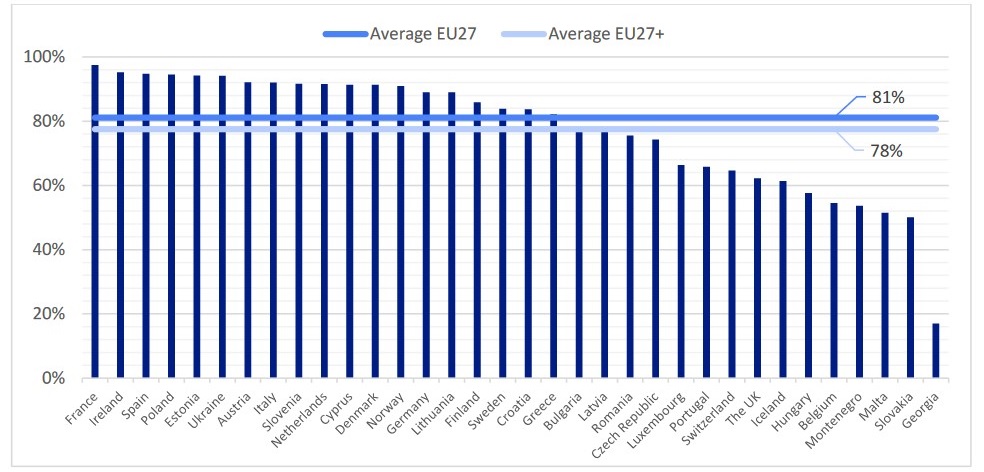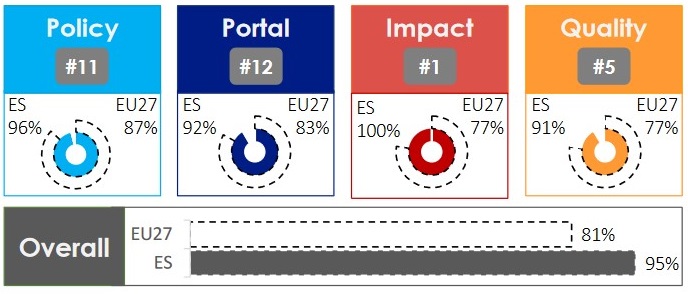Spain continues to be among the open data leaders in Europe for another year
Fecha de la noticia: 15-12-2021

For the seventh consecutive year, the European Data Portal has presented its Open Data Maturity assessment. This is a report that analyses a series of indicators to measure the maturity of open data across Europe, in order to understand the progress of each country, make comparisons and find areas for improvement.
This year, Spain ranks third with a score of 95%, 14 points above the European average (81%). First place goes to France (98%), followed by Ireland (also with 95%).

Spain, above the European average in all the analyzed categories
As every year, the report measures 4 categories:
- Policy, focusing on the existence of specific policies and strategies to promote open data at the national level.
- Impact, which analyzes activities to monitor and measure the reuse of open data.
- Portal, which evaluates the existing functions in the national platform (in the case of our country, datos.gob.es) to access open data and interact with the community.
- Quality, which studies the mechanisms that guarantee the quality of (meta)data.
Spain is ahead of Europe in all categories:

In total, Spain's score has increased by one percentage point compared to 2020, when it stood at 94%. It stands out especially in the impact category, where it is in first position with 100% of the score. The report highlights how the Aporta Initiative conducts an annual national survey to ascertain the control over the use of data by the various national, regional and local public bodies. It also highlights the collaborations that the institutions carry out with universities, such as the agreement adopted by the Valencian Government with all public universities in the Community to work together in training and research activities related to transparency and open data.
Our country continues in the group of open data prescribers
As part of the analysis, the European Portal groups all participating countries into four groups based on the assessment of open data maturity during 2021. With its score, Spain continues to place itself in the leading group of open data in Europe, called trend-setters. The group with the best results is completed by France, Ireland, Poland, Estonia and Ukraine.

These countries are characterized by an advanced open data policy and a platform with a wide range of functions to meet the needs of advanced users and publishers. They are also countries where there are initiatives to ensure the publication of high-quality data and compliance with the DCAT-AP European open data cataloging profile, and where communities around data reuse are in place. Finally, it is highlighted that there are established methodologies in place to assess the impact of data in the different domains.
Europe's average score rises
In 2021, the average score relating to open data maturity of EU27 countries is 81%, an increase of three percentage points compared to 2020.
The report highlights three trends observed in all the countries analysed:
- Member States are updating their policies to transpose the Open Data Directive into their national legislation. More and more countries are carrying out the transposition process. In the case of Spain, it was included in the Royal Decree-Law 24/2021, approved last December 2 by the Congress. It is worth mentioning that the Open Data Directive still requires the adoption of a future implementing regulation by the European Commission, where the list of high-value datasets to be provided free of charge through APIs is included.
- Understanding, monitoring and measuring the impact of open data is becoming more important. The impact dimension has seen the most growth in the last year, while the quality indicator is the least mature. In recent years, impact has been measured mainly through activities such as maintaining records of data downloads or creating lists of use cases. This year there has been a clear trend towards in-depth studies, such as desk research or surveys, to quantify and verify the impact of open data.
- The COVID-19 pandemic continues to highlight the value and impact of open data. Last year, the health situation led to highlight the importance of systematically collecting data and making it available to the public in an up-to-date manner. This year, the available data is complemented by statistics related to vaccination.
Future recommendations
The report ends with a series of recommendations for each group of countries. In the case of prescribers, a group that includes Spain, some issues are highlighted, such as continuing to develop thematic communities of providers and reusers, giving priority to the high-value data categories highlighted in the Open Data Directive. In this sense, Spain is moving forward with the creation of specific hubs for various sectors such as tourism or health.
Other examples of recommendations are to collaborate with other national and international teams to develop an experimental impact assessment framework and with academic institutions to provide advanced courses and training on open data.














